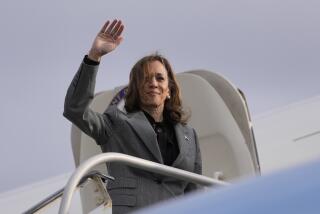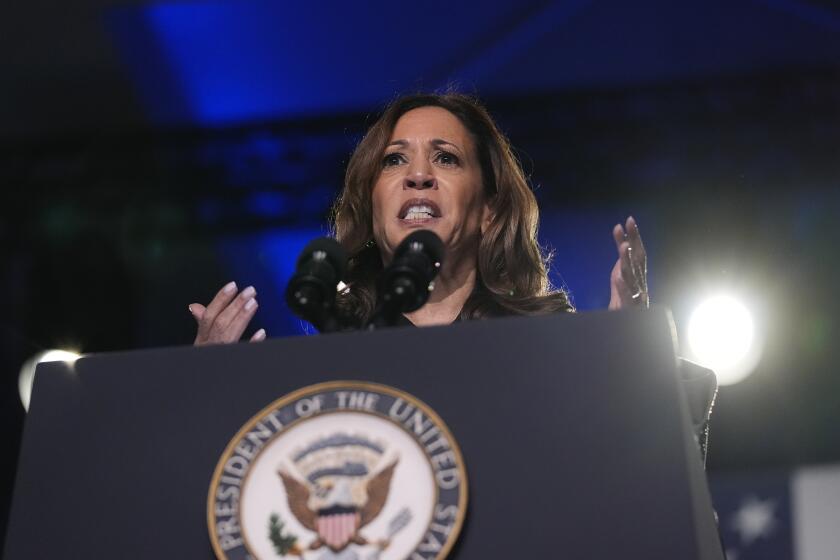Bush vows to minimize problems with air travel
President Bush, who since 2001 has had no familiarity with lost luggage or flight delays, expressed sympathy Thursday for those who do, and he ordered top transportation officials to find ways to clean up, by next summer, the problems that are plaguing air travel.
Focusing on two of the biggest issues facing air travelers, he told Transportation Secretary Mary E. Peters and the acting head of the Federal Aviation Administration, Bobby Sturgell, to reduce air traffic congestion at the nation’s busiest airports and to improve the government’s system for handling passengers’ complaints.
The president’s effort comes at the end of a summer that featured an eruption of problems within the industry: Canceled and delayed flights and lost baggage topped the list, with resulting disruptions in vacation and business travel -- and increasing chaos and complaints.
“There’s a lot of anger amongst our citizens about the fact that, you know, they’re just not being treated right,” Bush said. “We’ve got a problem, we understand there’s a problem, and we’re going to address the problem.”
He urged Congress to consider legislation modernizing the FAA.
Administration officials emphasized that they were not taking specific steps but were looking to the industry to come up with solutions.
Under consideration, Peters said, is a pricing procedure that would make it more expensive for airlines to operate flights during peak travel periods -- a course that airline executives said at a congressional hearing would not work to alleviate delays.
The government is focusing initially on New York area airports, primarily John F. Kennedy International Airport. Delays at the three major airports serving New York -- Kennedy, LaGuardia and Newark -- frequently ripple across the U.S. air traffic system.
Bush met Thursday in the Oval Office with Peters and Sturgell and said he had told them “to make sure that consumers are treated fairly and complaints are listened to, and that we address some of the egregious behavior that our consumers have been subjected to.”
“Endless hours sitting in a airplane on a runway, and there’s no communication between the pilot and the airport, is just not right,” Bush said.
Air passengers encountered what is widely described as the worst summer in the history of commercial aviation, with the greatest number of flight cancellations, White House Press Secretary Dana Perino said.
Rep. James L. Oberstar (D-Minn.), chairman of the House Committee on Transportation and Infrastructure, and two other panel members said that through July, more than one in four flights had been delayed. The number of planes grounded on tarmacs has increased by almost 49% over 2006, with delays of five hours or more increasing by 200%, they added.
“Every American air traveler today knows the only passenger aircraft not experiencing delays is Air Force One,” said Rep. John L. Mica of Florida, the senior Republican on the committee.
The Department of Transportation has proposed increasing the compensation of passengers bumped from oversold flights from $200 to $624, but the new focus is on alleviating delays brought about by the airlines’ overscheduling of flights into already-jammed airports.
Peters said that Kennedy airport, for example, had the capacity for about 44 departing flights between 8 a.m. to 9 a.m., “but on a typical Tuesday morning in August, airlines needed room for 57 scheduled departures.”
Passenger advocates questioned how much would be accomplished unless the government orders airlines to take specific steps.
“It’s not the FAA. It’s the airlines’ overscheduling that’s the problem,” said Kate Hanni, a real-estate broker from Napa Valley, Calif., who last winter founded the nonprofit Coalition for an Airline Passengers’ Bill of Rights. She said the government needed to impose fines for egregious airline operations “and not forgive them.”
Tim Winship, editor-at-large of www.smartertravel.com, said there has been “painfully little response on the part of the airlines when the government has spoken.”
He said the government was relying on market forces to “force the airlines to clean up their act, but the history is that has not happened.”
--
james.gerstenzang @latimes.com
More to Read
Get the L.A. Times Politics newsletter
Deeply reported insights into legislation, politics and policy from Sacramento, Washington and beyond. In your inbox three times per week.
You may occasionally receive promotional content from the Los Angeles Times.










